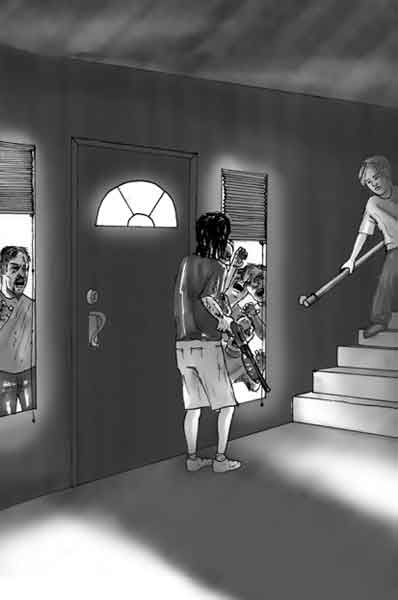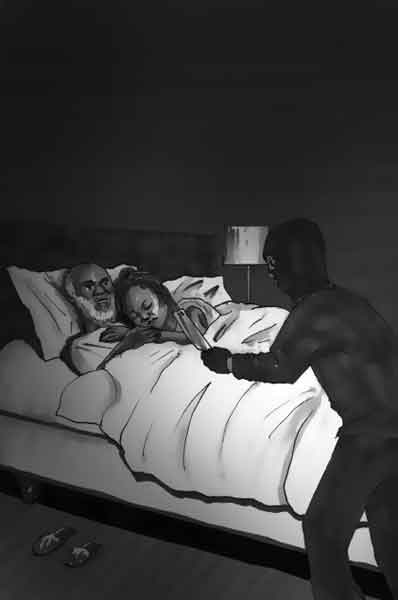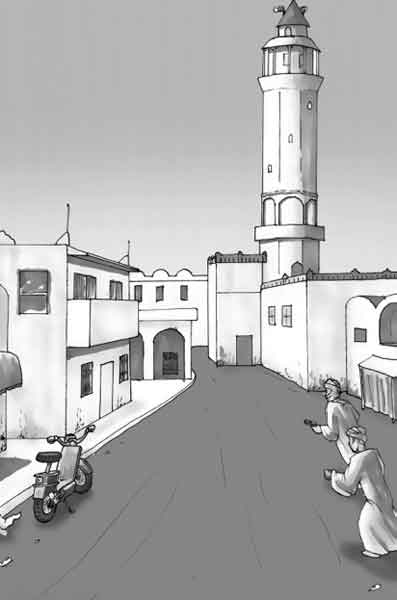6th Horseman, Extremist Edge Series: Part 1 (30 page)
Read 6th Horseman, Extremist Edge Series: Part 1 Online
Authors: Anderson Atlas
Tags: #apocalypse, #zombie, #sci fi, #apocalyptic, #alien invasion, #apocaliptic book, #apocalypse action, #apocalyptic survival zombies, #apocalypse aftermath, #graphic illustrated
Hana helps me up. “Your mother would want you
to stay alive.”
She gives me toilet paper for the snot river
that runs down my face. I feel embarrassed crying in front of
Hana.
“Everyone I know is dead. My friends. My
parents,” I whine.
“Maybe they got out. Maybe they are on their
way to a safe zone, just like us. Gotta keep going.”
I kinda snap out of it and run to my room. I
grab my broadsword off the wall. It was a Christmas gift a while
back, an authentic recreation of a middle age broadsword from a
blacksmith in West Pennsylvania. It isn’t very sharp, but it’s the
only weapon I have besides my twenty-two cal. rifle.
Hana laughs, “You’re planning on chopping
them up, huh?” I swing the sword around. It’s too heavy. “I guess
not.” I don’t wanna mess with my rifle. Those puppet things need a
flamethrower not a peashooter. I snap my fingers then pull my
camping box from my closet. Inside the box are my hatchet and
flashlight. I also grab my poncho, rain pants, and my first aid
kit. I pour half the bottle of fish food into the tank, pause, and
say bye to Birdy.
“One more thing.” I pull a photo of my Ma and
Dad from a picture frame and put it in my pack. “I’ll betcha she
got out. Maybe she’s holding up somewhere.” I run back downstairs.
Ian’s still in the entry, watching the street through the front
door window. “We need to go out the back,” Ian says. “They’ve
followed us here.”

“How the hell can they do that?” I complain,
feeling pissed. “We ran out of their sight!” I peek through the
window. “They’re like hound dogs or something.”
“Yeah, it is strange,” Hana replies. I run to
the back door. “We can go out back and hop some fences.” Hana and
Ian meet me at the back door. Hana raises her hands. “I need a
weapon. I’m way too vulnerable.”
I nod and run out the back door to the side
shed. Inside are a variety of sharp and useful yard tools. Hana
grabs a stiff metal rake. I look at my tiny hatchet and decide it
is too small for a primary weapon. I’ll keep it for backup. Its
case clips to my belt conveniently. I reach in the shed and grab a
shovel with a pointy tip. Too weird. I pick up a short pitchfork
that my Ma had used to spread straw over the back yard.
Ian pulls off a drop cloth that’s covering my
mountain bike. He smiles. “This might just be our way out.” My
bike, red with black swooshes, is a Razorback. Next to that are my
Ma and Dad’s bikes, older models, dust covered, and entwined with
spider webs.
Markus:
I
t’s another balmy
night in Tunisia. Tonight is our escape and it’s too soon. I want
one more night to prepare, to pray. Mitchell and I dress in our
stolen robes. He helps me tie a turban around my head so I look
like a local. I have no idea how long he’s been in the CIA, but
he’s good at this, very good. We wait for the people to start
heading to the stadium to hear their great scholar speak. I’m
nervous but excited at the same time. I feel like a different man.
This purpose I’d found gives me so much strength. The last thing I
want is to go home to the life I lived, a failing preacher in an
ungrateful and harsh world.
As I imagine the danger that lies ahead I say
to Mitchell, “I think God would have me carry a gun.”
“God’s Will, right?” Mitchell replies as he
peeks out the front doorway, which is covered by the stolen
tapestry.
“God would want his humble servant armed to
the teeth,” I say. Oh, if only my wife could see me now. I laugh at
bit. She’d slap me upside my head. Mitchell hands me a small
revolver he keeps in his boot. “You’re right. You need this. These
guys aren’t hippies. They believe in killing for what they
want.”
Mitchell smirks, so I feel the need to tell
him what I’ve had to deal with. “I had a run in with a gang that
extorted money for the Genovese Family of New York, or what was
left of it anyway.”
“These guys are ideologues, not thugs,”
Mitchell clarifies.
“Not sure I understand the difference.” I
continue, with or without Mitchell’s attention. We are waiting, and
it calms my nerves to speak. Must be why I make a good preacher, or
used to, anyway. “I moved to New York to fill the shoes of a dear
friend who died of colon cancer. His shoes were tough to fill. I’d
come from the South, had a small congregation. His church held up a
community I never knew existed in New York. I took over
after-school programs and political functions. I ran a weekend
daycare and a Bingo night every Thursday. I had services three
times on Sunday and three times during the week. I also had over
fifty kids studying under me in the ministry course and the
Christian studies group.
“Anyhow, I stumbled upon a devious scheme
plaguing my new parishioners. One afternoon my high school kids
were collecting trash and trimming trees around the neighborhood.
They’d been doing this once a month for years and it happened to be
my second time out with them. I rolled a large black cart up and
down the streets while the young kids ran around picking up trash,
and the older ones trimmed trees and raked leaves. I was three
streets from the church when I noticed a trend. All the cars had
little envelopes on the windows. They were about half the size of a
business card. No one knew or wanted to discuss what they were
until I spoke with little Becka. She was reluctant, but she
confessed. If her mother didn’t put twenty dollars in one of those
envelopes something bad would happen to her car.
“I gathered a group of neighbors together and
confronted them. At first no one said a word. Then the truth came
spillin’ out. Gang bribes. They’d pay off the gang so their cars
wouldn’t get keyed, stolen, or smashed up in the night. I was
horrified. I told the police, and four men were arrested that next
month while collecting the money.
“Then my house was broken in to. I was
sleeping like the dead and judged, when two men burst into my room.
Jesus, they scared me and my wife to death.

“They wore masks, of course, and brandished
knifes, big blades of the devil. They bound my hands behind me and
took me to meet their boss. I was forced to kneel, blindfolded. The
man I saw stayed in the shadows. He’d lost over five thousand
dollars because of me. A yearly salary of sixty thousand. He told
me he was going to kill me. I believed him, so I pleaded with him.
They let me go with a warning to stay out of their business, and I
did.
“The next month I saw the little envelopes on
all the cars again. I lost some parishioners. They were probably
scared to come to church. But, even worse, I’d lost their trust and
respect because I caved in. Eventually, we didn’t have enough
people to run the mid-week services.”
“Sounds like the Mafia to me,” Mitchell says.
“They
were
scared of you though. You were in America. We’re
not in America anymore.”
“I know that now.” I clear my throat.
“So, what’s your point?” Mitchell asks.
“I’m not a coward anymore. My wife would call
it bullheaded stupidity.”
There’s noise, but it dies down quickly.
Mitchell peeks through the tapestry. Suddenly, the mosque horns
start blurting out a song. It’s different than the call to prayer,
although just as hypnotic and peaceful. People start heading to the
stadium. It takes twenty minutes or so for the streets to clear. I
pace in the dirt of the mud hut. Of course, not everyone goes to
the stadium. There are still pockets of people here and there, and
a few European cars driving around. But the majority of people have
gone to the stadium.
Mitchell pokes his head out of the doorway
again. He shushes me, then waves for me to follow. He runs, half
crouched. My heart seems to stop. The setting sun turns the sky
bright orange and pink. The temperature is cool. I see everything,
every God-given detail of every wall, street, tree, and car. I
blink as my eyes start to water. The first stop is next to a
similar mud hut like ours. It’s empty. We slowly move from hut to
shack to house to housing complex until we are out of the slums.
I’m out of breath, but able to keep going.
Mitchell stops at a shopping area near the
Ali Ben Abid Mosque. The shopping plaza is in one of the nicer
parts of Medinine. The square is paved with sandy pavers and around
the center are newer brick shops and wagons. They’re all closed up.
Their tarps and tents are lowered and tied up. Ornamental light
poles are lined throughout the shopping area. Smack in the middle
of the square is a rather curious piece of artwork. It’s a rusted
pail that pours water into another much smaller pail and then into
two even smaller pails. At the bottom is one word inscribed on a
plaque. Translated by Mitchell, it reads
rebirth.
We run around to the shadow of the large pail
where there is another plaque that reads,
From the heavens came
the sword
. I reflect on the sign for a moment.
It’s strange that both the Bible and the
Quran preached the end of the world. In the Quran, Allah will wash
the Earth clean of all the sinners or nonbelievers, and restart a
new society of love and peace. In my faith there will be four
horsemen. They will arrive and begin the cleansing wars. In Islam,
a road of destruction will be torn across the world, preparing for
the coming of the twelfth Imam who will cleanse the world.
Mitchell takes off toward the mosque. We run
through an ancient Medinine neighborhood. The mud huts aren’t
square. They’re small dome shapes built right next to each other
and right on top of one another. Some of the hut stacks are three
stories tall. Narrow stairs snake up and over doorways, leading to
the different huts and down into the alleyways. If I wasn’t scared
for my life I would want to explore, maybe take a photo. Not this
trip.
We pass an outdoor vegetable market. Colorful
tapestries are draped over the plastic bins and the windows. The
dates, pomegranates, oranges — all as bright as the sun — are lying
in the open.
We turn a corner, still in the ancient
neighborhood with the small dome-like huts. These huts are even
nicer than the others. Cobblestone roads are under my feet. Plants
in pots on doorsteps and lampposts jut out of the top huts. It’s
such a contrasting view from the modern world. The ancient vista is
ruined by an ugly western-style apartment building on the
horizon.
I’m so tired. I don’t know how I’ve run so
long. God must be working miracles on my cardiovascular system.
We make it to the Ali Ben Abid Mosque. Its
tan brick tower rises majestically into the sky over eight stories
tall in a classic octagonal shape. Ornamental arches decorate the
bottom portion of the tower. My eyes move up the tower, noticing
the small windows on each level. At the eighth floor there is a
walkway that extends out from the frame of the tower and encircles
it. At its apex, the tower is topped with a pointed roof and four
loud speakers.
